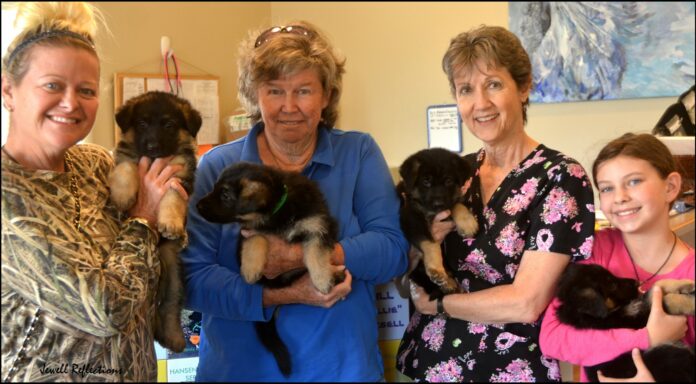
BY FRAN JEWELL

If you have ever visited my website, you will find a page called “No Bones About It,” which is my two bits of free advice and how I arrived at this newspaper column title. This is where I tell it like it is without any sugar coating. I talk about having two puppies, especially from the same litter: “Two puppies (especially siblings) are not better than one, unless you don’t want to have any relationship at all with your dogs. They will love each other, bond with each other, and leave you out of the loop. The only one that really benefits from you taking two puppies is the breeder or the shelter.”
What many people think is the positive aspect of having two puppies is that they will have a friend to play with. This is true to some extent, but having two puppies, littermates or not, is HUGE responsibility. To help them grow up mentally healthy, you must spend time alone with each of them. They must learn to be alone without the other dog to lead them. Many times one puppy will be more confident. At that point, the less confident puppy learns to completely depend on the other, setting them up for a lifetime of separation anxiety.
Puppies that grow up together tend to only rely on each other—they have a hard time separating who they are from the other. Each puppy needs to have training ALONE, and away from the other. That means you need to take each puppy alone for socialization with other dogs, with other people, in new places, to the vet, on trips in the car, and so on. They need to sleep in separate crates and have limited playtime with each other. If you don’t plan on spending this kind of time with each of them alone, they become so dependent upon each other that both of their emotional stabilities are compromised.
Housetraining is a nightmare. If one puppy goes in the house, you have no idea who did it, unless you practice strict separation, meaning one is in a crate or exercise pen while the other is loose in the house being closely supervised every minute by you.
There are so many opportunities for socialization and playtime with other dogs, including day care and play dates with other safe puppies and older dogs, there is no need to have two puppies at home.
Then, sadly, on the other end, as they grow older and near the end of their lives, if one dies, the other one is devastated. To me, this is one of the saddest parts of it all. They are so close emotionally it’s hard for them to go on without the other. Many times they die very close to each other in time. I lost two on ONE DAY! THAT was devastating for me!
There are so many more benefits to having only one puppy at a time. When you have one puppy at home, you have time to bond, love, socialize, train and enjoy so much more. My best advice is to put at least three years between dogs. Then, the older dog is a well-trained mentor for the puppy and your risk of losing them at the same time is minimized. One last thought is that there are always exceptions to every rule.
Fran Jewell is an Idaho Press Club award-winning columnist, IAABC-certified dog behavior consultant, NADOI-certified instructor #1096 and the owner of Positive Puppy Dog Training, LLC, in Sun Valley. For more information, visit www.positivepuppy.com or call (208) 578-1565.


